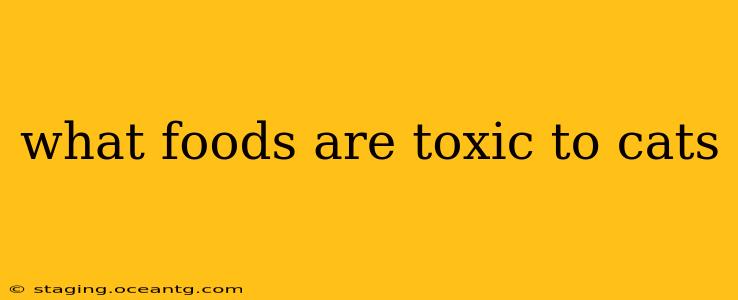Cats, with their independent and often curious nature, can sometimes ingest things that are harmful to their health. Knowing which foods are toxic to cats is crucial for responsible pet ownership. This comprehensive guide will delve into common toxic foods, explain the dangers, and provide tips on keeping your feline friend safe.
What Human Foods Are Poisonous to Cats?
Many common household foods can be incredibly dangerous, even deadly, for cats. These toxic foods can cause a range of symptoms, from mild digestive upset to organ failure. Here's a breakdown of some of the most harmful:
1. Onions and Garlic: These belong to the Allium family and contain compounds that damage red blood cells in cats, leading to anemia. This damage can be cumulative, meaning even small amounts consumed over time can be problematic. Both raw and cooked forms are toxic.
2. Chocolate: Similar to dogs, chocolate contains theobromine, a stimulant that cats metabolize slowly. Dark chocolate poses the greatest risk due to its higher theobromine content. Symptoms range from vomiting and diarrhea to hyperactivity, tremors, and even seizures.
3. Grapes and Raisins: While the exact toxic component remains unknown, grapes and raisins can cause acute kidney failure in cats. Even small amounts can be dangerous.
4. Xylitol (Artificial Sweetener): This sugar substitute is extremely toxic to cats, causing a rapid drop in blood sugar (hypoglycemia) and potentially liver failure. It’s found in many sugar-free products, so check labels carefully.
5. Alcohol: Just like in humans, alcohol is highly toxic to cats. Even small amounts can lead to severe liver damage, respiratory depression, and even death.
6. Avocado: Avocados contain persin, a toxin that can cause vomiting and diarrhea in cats.
7. Macadamia Nuts: These nuts contain an unknown toxin that can cause weakness, tremors, hyperthermia, and elevated heart rate in cats.
8. Raw Meat and Eggs: Raw meat can contain harmful bacteria like Salmonella and E. coli, while raw eggs contain avidin, which can interfere with biotin absorption. Always feed your cat cooked meat and eggs.
What Other Substances Pose a Threat to Cats?
Beyond common foods, several other substances can be toxic to your feline companion:
1. Certain Plants: Lilies are particularly dangerous, with even small amounts of pollen or water from a vase containing lilies causing severe kidney failure. Other toxic plants include tulips, daffodils, azaleas, and sago palms.
What are the Symptoms of Food Poisoning in Cats?
Recognizing the signs of food poisoning in your cat is crucial for prompt veterinary care. Symptoms can vary depending on the toxin and the amount ingested, but may include:
- Vomiting
- Diarrhea
- Lethargy
- Loss of appetite
- Tremors
- Seizures
- Difficulty breathing
- Increased thirst or urination
- Weakness
What Should I Do if My Cat Eats Something Toxic?
If you suspect your cat has ingested something toxic, contact your veterinarian or an animal poison control center immediately. Time is critical in treating toxicity. Have the following information ready:
- The name of the suspected toxin
- The amount your cat ingested
- The time of ingestion
- Your cat's age, weight, and breed
How Can I Prevent My Cat from Eating Toxic Foods?
Prevention is key. Here are some tips to protect your cat from toxic substances:
- Keep all toxic foods and substances out of your cat's reach.
- Store food in sealed containers.
- Clean up spills immediately.
- Be cautious about what you leave on countertops or tables.
- Be mindful of plants in your home and yard.
- Educate your family and visitors about the dangers of toxic foods for cats.
This information is intended for educational purposes and should not be considered veterinary advice. Always consult with a veterinarian if you have concerns about your cat's health.
